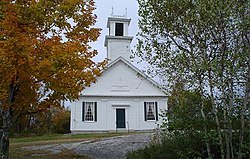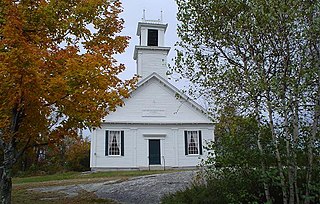
New Durham is a town in Strafford County, New Hampshire, United States. The population was 2,693 at the 2020 census. It is drained by the Merrymeeting, Cocheco and Ela rivers, and is known for Merrymeeting Lake. New Durham is home to the Powder Mill Fish Hatchery, located on Merrymeeting Road. Also located here is the Lions Club's Camp Pride, a camp for children and adults with special needs.
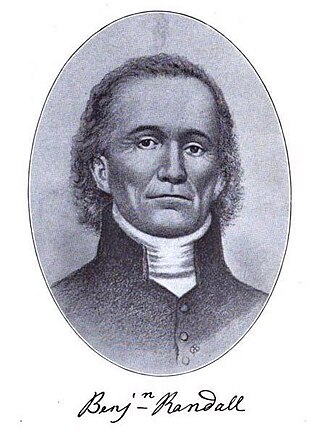
Free Will Baptists or Free Baptists are a group of General Baptist denominations of Christianity that teach free grace, free salvation and free will. The movement can be traced to the 1600s with the development of General Baptism in England. Its formal establishment is widely linked to the English theologian, Thomas Helwys who led the Baptist movement to believe in general atonement. He was an advocate of religious liberty at a time when to hold to such views could be dangerous and punishable by death. He died in prison as a consequence of the religious persecution of Protestant dissenters under King James I.
The National Association of Free Will Baptists (NAFWB) is a national body of Free Will Baptist churches in the United States and Canada, organized on November 5, 1935 in Nashville, Tennessee. The Association traces its history in the United States through two different lines: one beginning in the South in 1727 and another in the North in 1780. The "Palmer line," however, never developed as a formal denomination. It consisted of only about three churches in North Carolina. The NAFWB is the largest of the Free Will Baptist denominations.

Capon Chapel, also historically known as Capon Baptist Chapel and Capon Chapel Church, is a mid-19th century United Methodist church located near to the town of Capon Bridge, West Virginia, in the United States. Capon Chapel is one of the oldest existing log churches in Hampshire County, along with Mount Bethel Church and Old Pine Church.
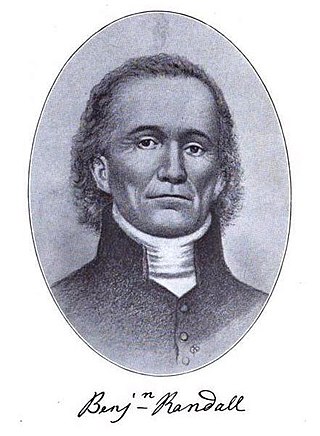
Benjamin Randall was an American Baptist minister the main organizer of the Free Will Baptists in the northeastern United States.
The Indian River Baptist Church is a historic former church building on Maine State Route 187, near its crossing of the Indian River in Addison, Maine. Built in 1853-54, it is one of the community's most sophisticated architectural structures, exhibiting transitional Greek Revival and Italianate styling. It was listed on the National Register of Historic Places in 1988. The building is now maintained by a local nonprofit organization.

The North Holderness Freewill Baptist Church–Holderness Historical Society Building is an historic church building in Holderness, New Hampshire. Built in 1860 for a Free Will Baptist congregation, it is a little-altered example of a rural vernacular church building. It was added to the National Register of Historic Places in 1986. The building was moved in 1994 from its original site on Owl Brook Road to U.S. Route 3 east of the center of Holderness by the Holderness Historic Society, who now own it.

The Richmond Community Church is a historic church building on Fitzwilliam Road in Richmond, New Hampshire, United States. Built in 1838, it is a distinctive regionally early example of Greek Revival church architecture executed in brick. The church was listed on the National Register of Historic Places in 1983. It is now owned by a Methodist congregation.

The First Freewill Baptist Church is a historic Free Will Baptist church building on Drew Hill Road north of Gilman's Corner Road in East Alton, New Hampshire. Built in 1826, and essentially unaltered since about 1847, it is a well-preserved example of a rural mid-19th century church. The building was listed on the National Register of Historic Places in 1978.

The New Hampton Community Church, formerly known as New Hampton Village Free Will Baptist Church, is a historic church on Main Street in New Hampton, New Hampshire. It is currently associated with the American Baptist denomination. Built about 1854, it is a prominent local example of Greek Revival architecture, and was listed on the National Register of Historic Places in 1985.

The First Free Will Baptist Church is a historic church on Granite Road in Ossipee, New Hampshire. The wood-frame white clapboarded building was built in 1856–57, and is a fine little-altered local example of a vernacular Greek Revival country church. The building was listed on the National Register of Historic Places in 1984.

The Union Church is a historic church on South Main Street in South Wolfeboro, New Hampshire, United States. Built in 1845 for the use of several small religious congregations, it is a well-preserved example of mid-19th century vernacular Greek Revival architecture. The building was listed on the National Register of Historic Places in 1982.

The Wolfeboro Centre Community Church is a historic church on New Hampshire Route 109 in Wolfeboro Center, New Hampshire. Built in 1841 for two separate congregations, it is a well-preserved example of a rural mid-19th century church. The building was listed on the National Register of Historic Places in 1984.
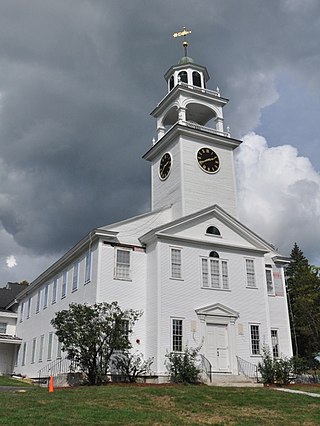
The Baptist New Meeting House is a historic church building at 461 Main Street in New London, New Hampshire. Built in 1826, its styling closely follows the patterns laid out by Asher Benjamin in his 1797 The Country Builder's Assistant, a major architectural guide from the Federal period. It was listed on the National Register of Historic Places in December 2005 and the New Hampshire State Register of Historic Places in April 2005.

Northfield Union Church is a historic church on Sondogardy Pond Road in Northfield, New Hampshire. Built in 1883, it is a fine example of modest Carpenter Gothic architecture, designed by Edward Dow, one of New Hampshire's leading late-19th century architects. It was added to the National Register of Historic Places in 1984.
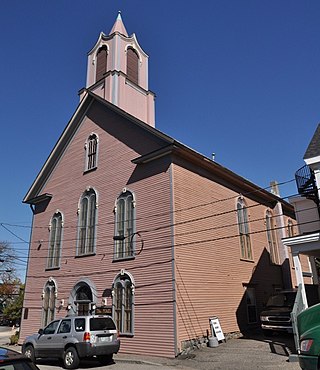
The Freewill Baptist Church—Peoples Baptist Church—New Hope Church is a historic structure built in 1868 located at 45 Pearl Street in Portsmouth, New Hampshire. The building, a fine local example of Italianate ecclesiastical architecture, was once owned by an African-American congregation. It was listed on the National Register of Historic Places in September 2002, and the New Hampshire State Register of Historic Places in January 2002. Later home to the Portsmouth Pearl, a center of arts and culture, it has more recently hosted art exhibitions, theatrical productions, and event rentals. As of June 2021, the building is listed for sale at nearly $1.5 million.

The Canaan Chapel is a historic chapel on Canaan Road in Barrington, New Hampshire. Built in 1881, it is a typical example of a rural Free Will Baptist church of the mid-19th century, exhibiting modest elements of Greek Revival design despite a late construction date for that style. The building was listed on the National Register of Historic Places in 1982.

The New Durham Town Hall is located at Main Street and Ridge Road in the center of New Durham, New Hampshire. Built in 1908, it is the town's second town hall, and an architecturally distinctive design of Dover architect Alvah T. Ramsdell. It was listed on the National Register of Historic Places in 1980.
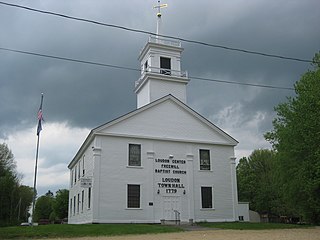
Loudon Town Hall is a historic New England meetinghouse at 433 Clough Hill Road in Loudon, New Hampshire. Built in 1779 and extensively restyled in 1847, this Greek Revival structure was used for many years for both religious and civic purposes; it now serves principally as a church, housing a Free Will Baptist congregation. The building was listed on the National Register of Historic Places in 1990; it is one of the oldest civic buildings in Merrimack County.

The Woodman Road Historic District of South Hampton, New Hampshire, is a small rural residential historic district consisting of two houses on either side of Woodman Road, a short way north of the state line between New Hampshire and Massachusetts. The Cornwell House, on the west side of the road, is a Greek Revival wood-frame house built c. 1850. Nearly opposite stands the c. 1830 Verge or Woodman House, which is known to have been used as a meeting place for a congregation of Free Will Baptists between 1830 and 1849.
